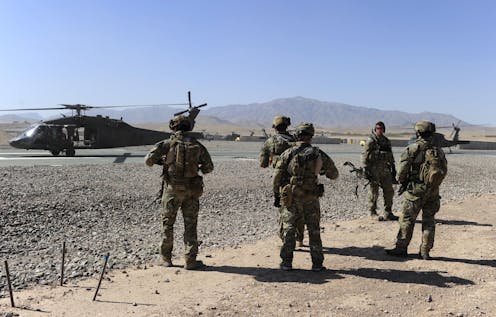Evidence of war crimes found against 25 Australian soldiers in Afghanistan
- Written by The Conversation

The inquiry into Australian Special Forces’ misconduct in Afghanistan has found evidence of war crimes involving 25 current or former Australian Defence Force personnel.
The inquiry found “credible information” of 23 incidents in which one or more non-combatants or prisoners of war “were unlawfully killed by or at the direction of members of the Special Operations Task Group, in circumstances which, if accepted by a jury, would be the war crime of murder”.
In a further two incidents, a non-combatant or prisoner was mistreated in a way that would be “the war crime of cruel treatment”.
Some incidents involved one victim, and in some there were multiple victims.
The inquiry found a total of 39 individuals were killed, and a further two cruelly treated.
The 25 current or former ADF personnel were perpetrators “either as principals or accessories” some of them on a single occasion and a few on multiple occasions.
None of the alleged crimes involved decisions made “under pressure, in the heat of battle”.
The inquiry has recommended the Chief of the Defence Force refer 36 matters to the Australian Federal Police for criminal investigation, relating to 23 incidents, and involving 19 individuals.
The inquiry, which examined conduct by the Special Forces between 2005 and 2016 was conducted by Justice Paul Brereton. Prime Minister Scott Morrison last week announced[1] the establishment of a special investigator’s office to prepare material for the Commonwealth Director of Public Prosecutions.
While the report is damning specifically for the special forces operation in the prolonged Afghanistan war, it will cast a pall over the Australian military more generally.
It recommends Australia immediately compensate families of Afghan nationals unlawfully killed, without waiting for criminal liability to be established.
“This will be an important step in rehabilitating Australia’s national reputation, in particular with Afghanistan, and it is simply the right thing to do,” the report says.
It says although many members of the Special Operations Task Group showed great courage and commitment, and the group had considerable achievements, “what is now known must disentitle the unit as a whole to eligibility for recognition for sustained outstanding service.”
“It has to be said that what this Report discloses is disgraceful and a profound betrayal of the Australian Defence Forces’ professional standards and expectations.”
The inquiry has recommended revoking the award of the Meritorious Unit Citation, “as an effective demonstration of the collective responsibility and accountability” of the group as a whole.
The investigation found that while patrol commanders on the ground were deeply involved, those higher up the chain did not know of the war crimes being perpetrated.
Among the evidence, the inquiry found credible information that “junior soldiers were required by their patrol commanders to shoot a prisoner, in order to achieve the sliders first kill, in a practice that was known as ‘blooding’”.
It also found “throwdowns” (weapons and radios) would be placed with the body as a “cover story” for operational reporting and to deflect scrutiny.
“This was reinforced with a cone of silence.”
The report laid blame on culture, condemning the “warrior culture” of some SAS commanders in Australia.
The Chief of the ADF, Angus Campbell said at a news conference he “sincerely and unreservedly apologised” to the people of Afghanistan for any wrongdoing by Australian soldiers.
Campbell said he had accepted all 143 Brereton recommendations, dealing with culture, governance, and accountability.
References
- ^ Prime Minister Scott Morrison last week announced (theconversation.com)

















